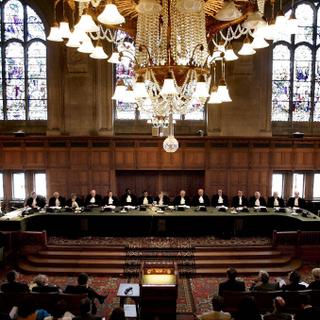


Behind the scenes at the International Court of Justice
In DepthSince 1947, the International Court of Justice in The Hague has issued rulings on conflicts around the world, from Israel's offensive in Gaza, Russia's invasion of Ukraine and even whether some states are more to blame for the effects of global warming.
Plants with thorns are banned on the grounds − except for the 2,500 rosebushes planted last fall by Mark van IJzendoorn, the gardener at the Peace Palace in The Hague, in the Netherlands. "Roses are the exception," he said. "They're the symbol of love." In early February, a cold wind was gusting through the building that houses the International Court of Justice (ICJ), the United Nations' (UN) highest court. With his cap pulled snugly down on his head, the Dutchman invited us to "come back in spring," by which time the roses would have bloomed. Overcoming the world's conflicts in a peaceful fashion requires the same sort of constant tending as that given by a gardener.
Established in the final hours of the Second World War, the ICJ seeks to resolve rather than to punish. "Faced with the barbarity of war, the goal was to build a humanitarian civilization based on the law," said Somali judge Abdulqawi Ahmed Yusuf, who receives visitors in his office overlooking the garden. Borders, territorial waters, diplomatic immunity and armed conflicts: For 76 years, at least 120 of the UN's 193 member states have come here to confront each other, brandishing the weaponry of international law. The judges have made rulings in around 100 cases. They have also issued some 30 advisory opinions at the request of the UN. States emerge either victorious or defeated, but never humiliated by a process to which they have, in one form or another, consented.
And the cases keep piling up. There's the ongoing case of South Africa v. Israel, in which the Court already ruled in January that the Israeli offensive in the Gaza Strip, begun after the Hamas attacks on October 7, 2023, has created a "plausible risk of genocide" of the Palestinians. Since Russia's invasion of Ukraine on February 24, 2022, Kyiv has stepped up its legal actions against Moscow. In the wake of the conflict in Nagorno-Karabakh in September 2021, Armenia and Azerbaijan have been bringing complaints against each other on an ongoing basis. In 2019, Gambia asked the court to ensure that Myanmar "stops atrocities and genocide against its own Rohingya people." The ICJ, also known as the "World Court," has yet to rule on the Canada-Netherlands v. Syria case, in which Syria has been accused of acts of torture and boycotted the hearings in the fall of 2023.
Final judgments not always enforced
"The Court reflects geopolitical dynamics," said Laurence Boisson de Chazournes, a French-Swiss professor of international law and lawyer. "The bottlenecks within the political institutions in New York [the UN Security Council and General Assembly] are causing countries to look for other spaces." All the more so, she added, because "the International Criminal Court [ICC] has not always done its job." Created by a treaty in 1988 and not by the UN, The Hague's other court, 3 kilometers from the Peace Palace, is supposed to prosecute and punish the perpetrators of war crimes, crimes against humanity and genocide. But in the 20 years it has been in operation, governments have taken advantage of it to such an extent that its credibility has been undermined.
You have 83.46% of this article left to read. The rest is for subscribers only.
